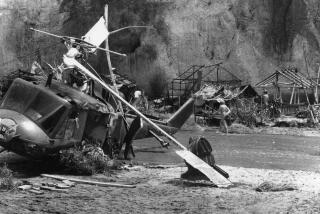From the Archives: ‘Heaven’s Gate’: The film flop that reshaped Hollywood
Kris Kristofferson chuckles and then sighs as he recalls what it was like working on the climactic battle scene in “Heaven’s Gate,” Michael Cimino’s 1980 epic anti-western that became one of the biggest, most notorious flops in Hollywood history.
“It was an ordeal,” the raspy-throated actor and singer recalled in a phone call this week from his home on Maui as he talked about how Cimino required 52 takes just to film one scene of Kristofferson’s character being slapped awake in a bed and lashing a bullwhip at town merchants. “We kept doing it right,” the actor recalled, “but some guy [in the scene] didn’t do it just right.”
It has been nearly a quarter-century since “Heaven’s Gate” debuted in New York to disastrous reviews. The New York Times compared “Heaven’s Gate” to “a forced four-hour walking tour of one’s own living room.” The Toronto Globe and Mail said “it really is that bad.”
Even today, the film’s title is a symbol of failure.
On Sunday night, Trio, the arts and culture cable television channel, will air “Final Cut: The Making of ‘Heaven’s Gate’ and the Unmaking of a Studio,” an original 90-minute documentary on the production of United Artists’ “Heaven’s Gate” that, in the words of one of the producers, will “revisit the crime scene.”
“Final Cut” director Michael Epstein and his co-producer, Rachael Horovitz, argue that the UA film was unfairly judged a generation ago and that its demise ushered in a new era of doing business in Hollywood -- one in which the studios took back control from the artists and box office trumped everything.
The documentary is part of a monthlong Trio series called “Flops!” celebrating pop culture’s great failures, from the DeLorean automobile to a Madonna movie marathon. A commercial-free showing of Cimino’s film will follow the documentary.
Although Cimino declined to be interviewed for the documentary, Epstein said the director helped convince Kristofferson to go on camera. “Kris didn’t want to sit down unless Michael said it was OK,” Epstein said.
Even United Artists, now an arm of MGM, cooperated. “After 25 years of watching the press eviscerate the film and Michael Cimino, there was an obvious and understandable reluctance” on the studio’s part to participate, Epstein said. “One of the things we told people was, ‘We like “Heaven’s Gate.” ’ ... Our goal was not to dredge up all the old garbage.”
Still, the documentary does not pull its punches. The film makes clear that UA never researched Cimino’s background to discover that he had come from the world of TV commercials, where directors are lauded for doing shot after shot of the same scene. It also features the actors recalling how they spent hours every day for weeks learning how to roller skate -- even backward. And the cast and crew recalling how tiring it was to travel three hours each way on dirt roads to get to the location where Cimino wanted to film the final battle.
Cimino based his film on a real-life chapter from the American West: the Johnson County range wars in 1890s Wyoming. The film starred Kristofferson, Jeff Bridges, Christopher Walken and French actress Isabelle Huppert.
“ ‘Heaven’s Gate’ is held out in the industry as amateur hour or the worst movie ever made. All these things are untrue,” Epstein said.
At a time when the average major film cost $12.5 million, Cimino’s came in at $36 million. The news sent shockwaves through Hollywood and nearly destroyed United Artists, the studio founded in 1919 by Hollywood luminaries Mary Pickford, Douglas Fairbanks, Charlie Chaplin and D.W. Griffith.
The documentary is filled with footage of the film, along with shots taken on location in Montana on the movie set, as well as TV news footage.
In one interview around the time the film came out, “Today” show critic Gene Shalit tells Cimino he has done a little arithmetic and figured out that 100 American families making $25,000 a year could live 14 years on $36 million. “Is it obscene to spend that much money for a single movie?” he asked Cimino.
“I think one has to understand what the motives were,” Cimino replied stiffly. “Is it obscene to spend $30 or $40 million on a blatantly commercial effort whose sole purpose is to make more money? Is that obscene?”
Only 18 months before the release of “Heaven’s Gate,” Cimino was being hailed for his gripping Vietnam-era film, “The Deer Hunter,” which had captured the Oscar for best picture. On only his second film, Cimino also walked away with the Academy Award for best director.
“He went from a big Oscar film to suddenly being a pariah -- everybody’s whipping boy,” Kristofferson said. “Everybody who didn’t get to do a film blamed ‘Heaven’s Gate,’ saying all the money went to ‘Heaven’s Gate.’ ”
Kristofferson would not escape entirely, either.
“I’m sure it knocked me off the course I had been on right then,” he said. “I think that it made me, for a while, unmarketable. But a lot of things I was doing then made me unmarketable,” like traveling to Nicaragua and supporting the leftist Sandinistas.
“There was a sense in the industry that lunatics had taken over the asylum and we are going to drive everybody into the ground,” Epstein said.
The documentary was partly inspired by Steven Bach’s 1985 Hollywood insider book, “Final Cut,” in which the onetime head of East Coast and European production for United Artists chronicled the “Heaven’s Gate” fiasco from ground zero. Bach, who was a consultant on the documentary, is interviewed on camera, as are former UA production vice president David Field, actors Kristofferson, Bridges and Brad Dourif, cinematographer Vilmos Zsigmond and others.
Narrator Willem Dafoe points out that “Heaven’s Gate” was not unusual in what it set out to accomplish. Hundreds, if not thousands, of films, from “Ben-Hur” to “Close Encounters of the Third Kind,” had been made on such a massive scale. What separated “Heaven’s Gate” from almost every other epic film, Dafoe tells viewers, is “the extreme, almost fanatic attention to detail its director paid to every single shot.”
“By the end of the first six days of shooting, Michael Cimino had fallen five days behind schedule and spent $900,000 for a minute and a half of usable film,” Dafoe says in his narration. “Two weeks in, he was 10 days behind schedule and 15 pages behind. By then, Michael Cimino had exposed two hours of film, less than three minutes of that he was willing to approve -- all at a rough cost of $1 million per usable minute. The alarm bells went off at [United Artists].”
The negative buzz surrounding the production wasn’t helped when Les Gapay, a former Wall Street Journal reporter who had moved to Montana for a change in lifestyle, signed on as a $30-a-day extra for two months and wrote an eye-opening “unauthorized” account of his experiences on “Heaven’s Gate” in the Los Angeles Times.
After its disastrous opening in New York, the film was quickly withdrawn to allow Cimino more time to work in the editing room. Five months later, a radically re-cut version of “Heaven’s Gate” opened in Los Angeles, but the damage had been done.
The documentary makes clear that while the film is still regarded as “the film that bankrupted a studio,” the reality is that Transamerica, a multibillion-dollar conglomerate that was then the parent firm of UA, wrote off the entire loss of “Heaven’s Gate” -- $44 million -- two days after its New York premiere. “Its stock fell half a point, which it fully recovered the next day,” Dafoe says. UA was subsequently sold to MGM, which years later resurrected the name for its art-house unit.
Yet, for all the controversies over cost overruns and the perception that this was an out-of-control production, Kristofferson believes “Heaven’s Gate” fell victim to an era of conservatism that swept the country in 1980 with the election of President Reagan.
“It was a negative piece of U.S. history -- the Johnson County wars -- where people were allowed to go in with a death list and kill citizens because of the cattleman’s association,” the actor said. “It was right when Reagan and all those guys were going in. It was the dark side of the American dream.”
The documentary drives home the point that the controversy over “Heaven’s Gate” ushered in a new era in Hollywood.
“In the 25 years since ‘Heaven’s Gate,’ much has changed,” Dafoe tells viewers. “Box office totals are now tracked by every media outlet in the country, and films are judged a success or failure in a single weekend. The business of Hollywood has overwhelmed everything else, and it’s hard to see how the movies are better off for it.”
More to Read
Only good movies
Get the Indie Focus newsletter, Mark Olsen's weekly guide to the world of cinema.
You may occasionally receive promotional content from the Los Angeles Times.










